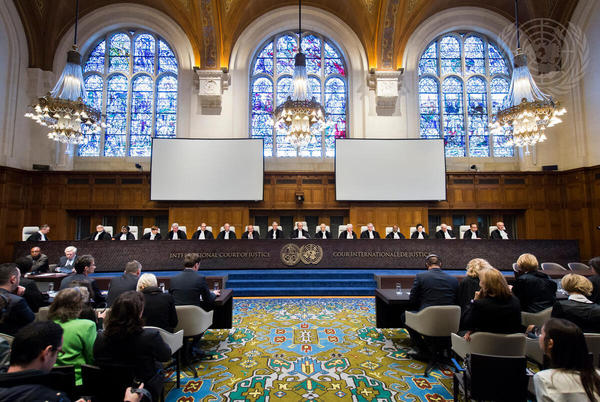Hearings resume in The Hague from September 18 to 27 in one of Ukraine’s two ongoing cases against the Russian Federation before the International Court of Justice (ICJ).
Ukraine lodged a complaint with the ICJ, the United Nations’ judicial body responsible for settling disputes between states, on February 26, 2022, two days after the Russian army launched its offensive on its territory.
A dispute over “genocide”, Russia’s justification for the war in Ukraine
Russian President Vladimir Putin justified his “special military operation” in order to “demilitarize and denazify Ukraine”, which he claimed was committing genocide against the Russian-speaking population in the Donetsk and Luhansk regions of eastern Ukraine.
Kyiv intends to demonstrate that Russia’s military intervention has no legal basis and is based on unfounded allegations of genocide.
The dispute therefore concerns the interpretation and application of the 1948 Convention on the Prevention and Punishment of the Crime of Genocide.
Russia’s arguments under consideration
By Order of March 16, 2022, the ICJ has already indicated among its provisional measures that “the Russian Federation shall immediately suspend the military operations it began on February 24, 2022 in the territory of Ukraine”.
Russia did not accept this order, and raised “preliminary objections” to the Court’s jurisdiction and the inadmissibility of the application. It is these arguments, already set out in part in a letter dated March 7, 2022, that the ICJ will be examining from September 18 to 27, during public hearings that will have a major international impact.
Europe and its allies mobilised, with 32 States involved
The Statute of the ICJ allows States concerned by treaties or conventions to which they are party, as is the case for the 1948 Convention on the Crime of Genocide, to intervene in proceedings if they consider that they “have an interest of a legal nature which is likely to be affected by the decision in the case”.
In 2022, 33 States filed statements of intervention – of which 32 were deemed admissible by the ICJ at the preliminary objections stage to discuss the question of the Court’s jurisdiction.
These “intervening” countries are drawn from the 27 European Union Member States and its allies (Liechtenstein, Norway, Canada, the United Kingdom, New Zealand and Australia). They are each represented by an “agent”, usually an ambassador or the international legal adviser of their foreign ministry.
A separate Ukraine-Russia dispute before the ICJ
Ukraine has already lodged a complaint against Russia with the ICJ in 2017, for violation of international conventions on the suppression of the financing of terrorism and the elimination of all forms of racial discrimination.
This was three years after what Ukraine denounced as Moscow’s “illegal occupation of Crimea”. Kyiv accuses Russia of supporting pro-Russian separatists and carrying out a “cultural eradication campaign” against Crimean Tatars with a view to “Russifying” civilians. This trial is still ongoing.
USEFUL LINKS




